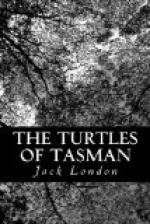He never descended to the trail. A man travelling the trail could have no knowledge of his lurking presence on the bank above. The snow surface was unbroken. There was no place where his tracks left the main trail.
As the nights grew longer, his periods of daylight watching of the trail grew shorter. Once a sled went by with jingling bells in the darkness, and with sullen resentment he chewed his biscuits and listened to the sounds. Chance conspired against him. Faithfully he had watched the trail for ten days, suffering from the cold all the prolonged torment of the damned, and nothing had happened. Only an Indian, travelling light, had passed in. Now, in the night, when it was impossible for him to watch, men and dogs and a sled loaded with life, passed out, bound south to the sea and the sun and civilisation.
So it was that he conceived of the sled for which he waited. It was loaded with life, his life. His life was fading, fainting, gasping away in the tent in the snow. He was weak from lack of food, and could not travel of himself. But on the sled for which he waited were dogs that would drag him, food that would fan up the flame of his life, money that would furnish sea and sun and civilisation. Sea and sun and civilisation became terms interchangeable with life, his life, and they were loaded there on the sled for which he waited. The idea became an obsession, and he grew to think of himself as the rightful and deprived owner of the sled-load of life.
His flour was running short, and he went back to two biscuits in the morning and two biscuits at night. Because, of this his weakness increased and the cold bit in more savagely, and day by day he watched by the dead trail that would not live for him. At last the scurvy entered upon its next stage. The skin was unable longer to cast off the impurity of the blood, and the result was that the body began to swell. His ankles grew puffy, and the ache in them kept him awake long hours at night. Next, the swelling jumped to his knees, and the sum of his pain was more than doubled.
Then there came a cold snap. The temperature went down and down—forty, fifty, sixty degrees below zero. He had no thermometer, but this he knew by the signs and natural phenomena understood by all men in that country—the crackling of water thrown on the snow, the swift sharpness of the bite of the frost, and the rapidity with which his breath froze and coated the canvas walls and roof of the tent. Vainly he fought the cold and strove to maintain his watch on the bank. In his weak condition he was an easy prey, and the frost sank its teeth deep into him before he fled away to the tent and crouched by the fire. His nose and cheeks were frozen and turned black, and his left thumb had frozen inside the mitten. He concluded that he would escape with the loss of the first joint.
Then it was, beaten into the tent by the frost, that the trail, with monstrous irony, suddenly teemed with life. Three sleds went by the first day, and two the second. Once, during each day, he fought his way out to the bank only to succumb and retreat, and each of the two times, within half-an-hour after he retreated, a sled went by.




